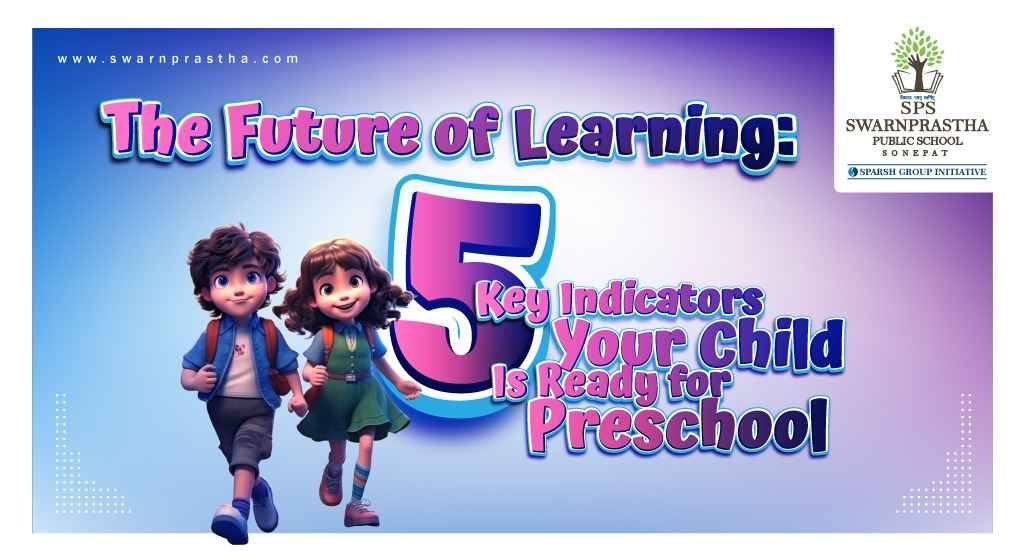Preschool is a crucial stage in every child’s education, as it is the initial stage that influences academic and social achievement. This step can be challenging, but by understanding what prepares a child for preschool, parents or guardians can make the transition a rewarding experience. The following is a list of five important indications that your child is ready for preschool—a feat filled with responsibilities and fun.

1. Developing Social Skills
Since one of the critical criteria for enrolment in a preschool is a child’s social readiness, one of the things that parents should look for is a child’s readiness to engage in simple social communication processes. Specifically, preschool settings are characterised by group interactions, sharing and cooperative games, so that children can develop social skills. If a child is keen on playing with other children and interacts during games, or even imitates the actions of others during playdates, these are positive signs that the child is ready for preschool.
Why it matters: Relationships and conflicts are two essential features of any early learning environment and social development enables children to foster these aspects.
2. Comfort with Routine
Preschool sets a daily timetable that involves play, learning time, snacks and nap times, within the day. Children learn to appreciate routine with set structures of events all through the day.
Indicators: Be watchful for cues that your child is capable of managing those basic tasks at home e.g. waking up, feeding or even going to bed. Preschool prepares children to accomplish these tasks over a period of time, prepping them with a definite step towards being independent.
Implications: Recognising familiar features when going to preschool helps children adjust to the new schedule, which provides them with security and relieves their separation stress.
3. Basic Communication Skills
Personal and effective communication is the central organ of successful preschool processes. For children heading for preschool, they are not required to speak properly, forming complete sentences when making their basic needs known. They should be in a position to understand simple instructions and voice their needs.
What to observe: A child ready for preschool ought to have the ability to say basic things like “water,” “toy” or “help” or answer ‘What do you want to play with’ or ‘Are you hungry?’.
Why it’s critical: These positive communication characteristics enable children to communicate with teachers and other children, respond to caregivers’ questions, in the process, taking their first crucial step towards learning.
4. Developing Independence
Preschool promotes independence as children learn to complete small tasks on their own, such as putting on their shoes, washing their hands, or tidying up toys. While mastery isn’t required, a child’s willingness to try these tasks with minimal assistance is a positive indicator of progress.
Key behaviours: Notice if your child attempts to dress themselves, pick up toys after playtime, or show interest in activities that require personal effort. This independence reflects a readiness to tackle the challenges of a preschool setting.
Benefits: Independent skills contribute to a child’s sense of accomplishment and build resilience, preparing them for more complex tasks as they progress through their educational journey.
5. Curiosity and Desire to Learn
Children who are curious and willing to learn about new things are likely to blossom in a setting that embraces exploration and learning in preschool. A child's curiosity, attention to a story, or playing with blocks or a colouring book are basic elements of preschool learning.
Signs to recognise: Signs of preschool readiness include a child’s ability to settle in a new environment with no fuss, their joy when they find something new or their eagerness for storytelling and playtime with others.
Why it matters: Preschool promotes natural curiosity. The world around is already interesting to a child and therefore, enjoying different activities in a preschool curriculum leads to an interest to learn more.
Conclusion: Preparing for a New Chapter
Deciding if a child is ready for preschool is a significant step for any parent. By observing these five key indicators—social skills, comfort with routine, communication abilities, independence and curiosity—parents can gain confidence that their child is prepared for this new and exciting stage of learning. When children enter a reputable institution like Swarnprastha Public School, which is equipped with these facilities, they are better positioned to develop their cognitive, emotional, and social abilities in a nurturing environment.
Swarnprastha Public School is dedicated to fostering young learners’ growth by providing an engaging and supportive setting. Assessing these readiness signs not only benefits the child but sets the stage for a positive and enriching educational journey.
FAQ
1. How do I know if my child is socially ready for preschool?
See if your child has some or all of these skills - social skills (playing with others), comfort with routine (willingness to follow a structure of play time, meal time, sleep time), communication abilities (basic words or gestures), independence and curiosity. Parents can then gain confidence that their child is prepared for Preschool, where all of these skills would nurtured.


